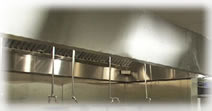Exhaust Pressure Washing

When you picture chunks and hunks of grease clogging up an exhaust pipe, it's enough to make you lose your appetite. But, did you know that this could actually affect the quality of the food? When ducts are backed up things like uneven cooking surface temperatures, grease accumulation and even food storage temperatures (in a hot kitchen, things like prepped food go rancid quicker) can make for unhappy plates. Furthermore, a cook cooking in these conditions could grow frustrated, leading to lackadaisical work.
This leads to another reason why poorly maintained exhaust systems can hinder an eating establishment. Comfort is something people yearn for when going out to eat. When air-conditioning is not functioning properly because of the problems starting with the exhaust duct, people will be hot and uncomfortable- and may go somewhere else. Additionally, like the cook mentioned above, wait staff and other employees may also begin to grow irritable. Smoke and odors may also not be removed as well, heightening these negative feelings. All of this can indeed hurt service- and hurt profits.
As stated in the first paragraph, fires can be caused as a result of a flame sparking in the built-up grease. The fire can damage the restaurant, causing the need for expensive repair or worst-case scenario, being totally destroyed. Insurance or not, this is devastating. Customers will find somewhere else to go while the restaurant is being rebuilt. Accidents happen, but knowing that a fire could have been prevented by simply cleaning grease from the exhaust can make hindsight a harsh reality. This is a huge reason restaurants need to invest in a pressure washer, or why pressure washer contractors need to target food service establishments for business. They can't afford not to. In addition, local fire and health service departments have varying standards when it comes to exhaust systems. No matter what they may be, they must be adhered to stay in business.
It is crucial to maintain a proper cleaning schedule of a restaurant maintenance system. Proper ventilation is imperative to the comfort of staff and patrons and to the quality of food and overall dining experience. It is recommended to clean the exhaust system every three months, however, fast-food places or restaurants with lots of food output may even need to perform a monthly cleaning.
Aside from restaurants, hospitals, schools, assisted living facilities, camps, institutions, airports and other facilities with kitchens are places that need to take this information into consideration- and are good prospects for a pressure washing business.
The publisher of these pages is in no way responsible for any damage caused to you, your pressure washer, anyone else, your property, or anyone else's property by trying to implement or by successfully implementing the above-mentioned performance and services.


